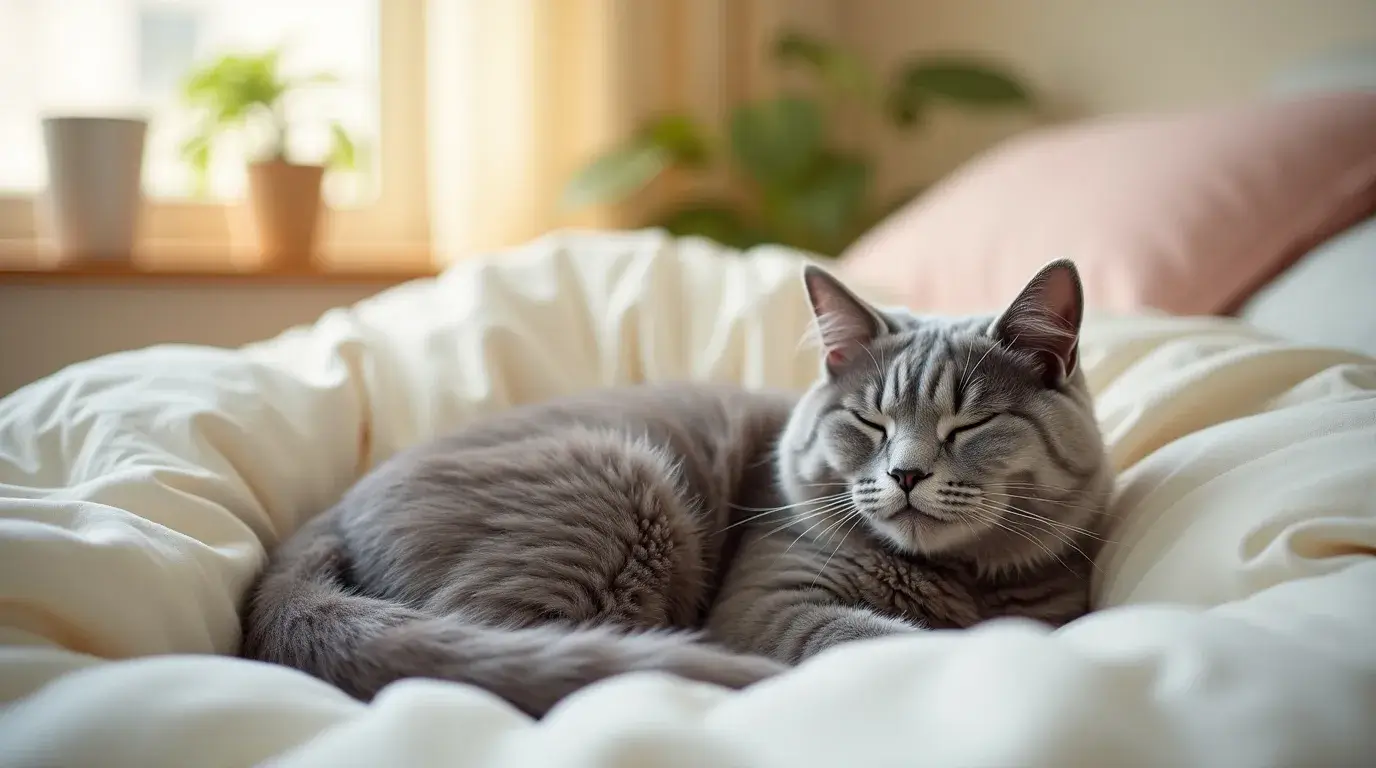Cats are known for their mysterious behaviors, and one of the most puzzling—and sometimes frustrating—habits is their tendency to meow at night. If your cat becomes unusually vocal when the sun goes down, you’re not alone. Many pet owners struggle with this nocturnal behavior. In this article, we’ll explore the Reasons behind cat meowing at night, how to manage it, and when to be concerned. This in-depth guide is optimized for the focus keyword “Cat Meow at Night” and structured to rank well on Google.
Understanding Cat Behavior: Why Cats Are Active at Night
Cats are crepuscular by nature, meaning they are most active during dawn and dusk. This is deeply ingrained in their hunting instincts. However, many cats—especially those left alone during the day—become more active and vocal at night due to boredom, hunger, or the need for attention. In the wild, nighttime is prime hunting time, and even domesticated cats often retain this instinct.
Even indoor cats that are pampered and well-fed may exhibit this behavior due to ingrained habits or a mismatch in energy schedules between cats and humans.
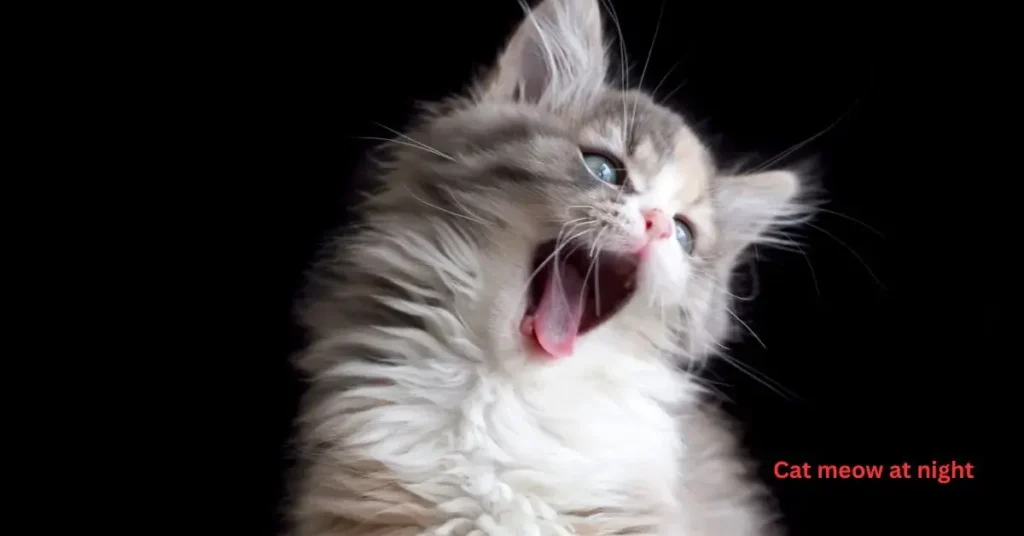
Common Reasons for Cat Meowing at Night
1. Seeking Attention
Some cats meow simply because they want your attention. If you’re busy during the day, your cat may try to engage with you at night. They might be trying to initiate play or even just enjoy your company after hours of solitude.
2. Hunger or Thirst
Your cat may be hungry or thirsty during the night. Ensure food and fresh water are accessible before bedtime. A cat with an empty stomach may vocalize to communicate discomfort. Consider scheduled feeding times that include a late evening snack.
3. Loneliness or Separation Anxiety
Cats form close bonds with their humans. If they feel lonely—especially if they’re used to sleeping near you—they may meow to express their discomfort. This can be particularly common in kittens or recently adopted cats adjusting to a new environment.
4. Discomfort or Health Issues
If your cat suddenly starts vocalizing at night, it could indicate pain or an underlying health condition. Older cats may suffer from cognitive dysfunction syndrome (CDS), similar to dementia in humans, causing confusion and vocal outbursts. Urinary tract infections, arthritis, or hyperthyroidism can also lead to increased meowing.
5. Mating Behavior
Unneutered or unspayed cats are more likely to meow loudly at night. This is a natural mating call and can be very persistent. Spaying or neutering your cat can reduce or eliminate this behavior and also improve overall health.
6. Territorial Instincts or Outdoor Stimuli
Indoor cats may respond to sights, sounds, or smells of other animals outside. Their meowing could be a territorial response. You might not see the neighborhood cat on your porch at 2 a.m., but your cat probably does.
7. Playfulness and Energy Release
Kittens and young cats often meow at night due to excess energy. Without enough daytime activity, they may become restless after dark. A lack of stimulation during the day can lead to zoomies and vocalization at night.
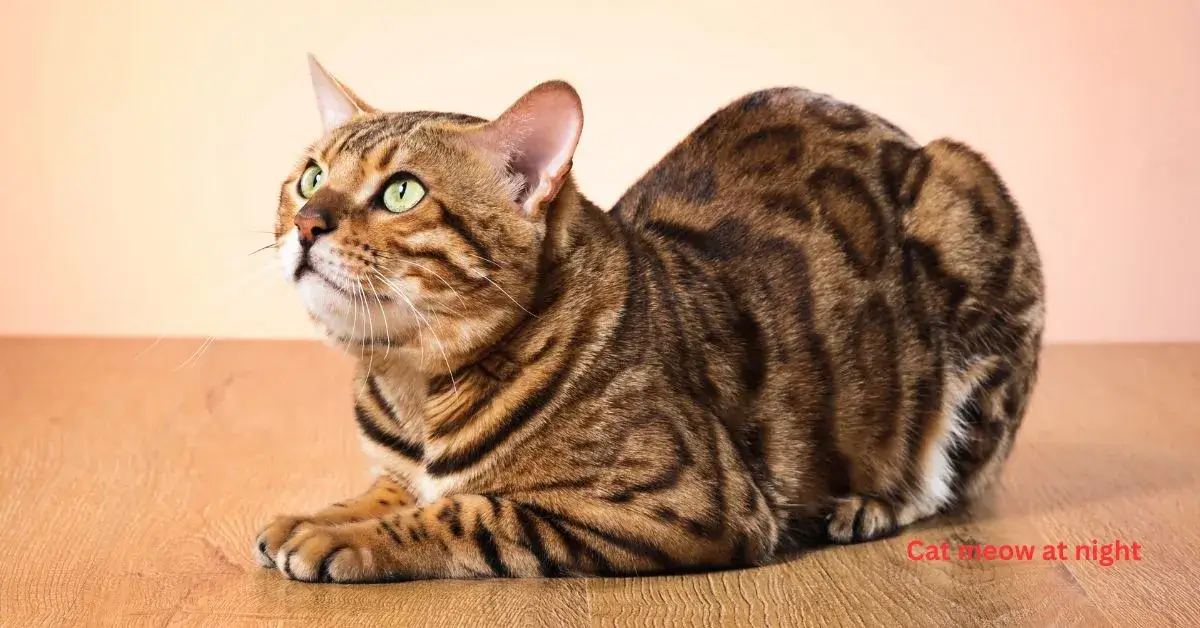
How Do You Stop a Cat from Meowing at Night?
Reducing nighttime meowing starts with understanding the cause. Here are effective strategies to calm your cat and get a good night’s sleep:
1. Establish a Bedtime Routine
Just like children, cats benefit from routine. Feed, groom, and play with your cat before bed to help them wind down. A structured evening routine helps signal to your cat that it’s time to sleep.
2. Interactive Play During the Day
Increase playtime during daylight hours using toys like feather wands, laser pointers, and puzzle feeders to burn off energy. This ensures your cat feels satisfied and more inclined to rest.
3. Feed a Satisfying Meal Before Bed
A protein-rich meal can help your cat sleep through the night. Consider a small wet food portion before bedtime. A full belly often leads to a restful sleep.
4. Ignore the Meowing (If Safe)
Responding to nighttime cries can reinforce the behavior. If you’ve ruled out medical issues, try ignoring the meows. Be patient—behavioral change takes time.
5. Provide Comfort and Enrichment
Offer cozy beds, blankets, and calming products like pheromone diffusers to create a peaceful environment. You can also include elevated perches or cat trees near windows to give them a peaceful lookout spot.
6. Consider a Companion
If your cat is lonely, adopting another feline friend (if feasible) can reduce boredom and anxiety. However, this should be considered carefully, as not all cats accept companions easily.
7. Consult a Veterinarian
If meowing persists or increases suddenly, seek veterinary advice to rule out medical problems. Cats are masters at hiding illness, so vocalizing might be one of the few outward signs of discomfort.
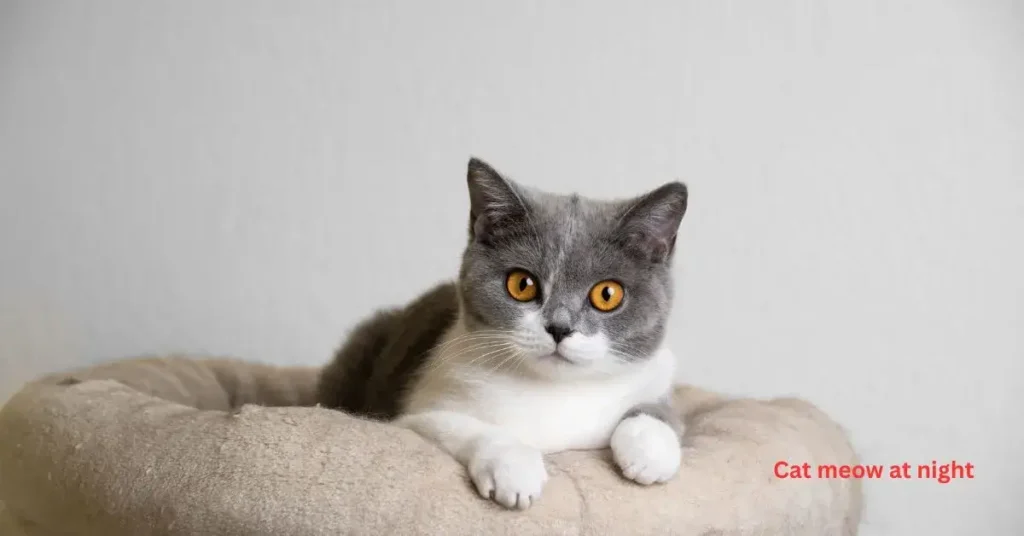
When Is Nighttime Meowing a Cause for Concern?
Nighttime meowing can indicate a serious issue, especially in older cats. Monitor your cat for additional symptoms like:
- Loss of appetite
- Vomiting or diarrhea
- Lethargy
- Excessive grooming or hiding
- Increased thirst or urination
If these signs appear, schedule a veterinary check-up promptly. Early diagnosis is critical in treating underlying medical conditions effectively.
Cat Breeds Known for Nighttime Vocalization
Some cat breeds are naturally more vocal than others. If your feline belongs to one of these breeds, nighttime meowing might be part of their personality:
- Siamese
- Oriental Shorthair
- Burmese
- Tonkinese
These breeds are known for their expressive nature and thrive on human interaction, making them more prone to nighttime conversations.
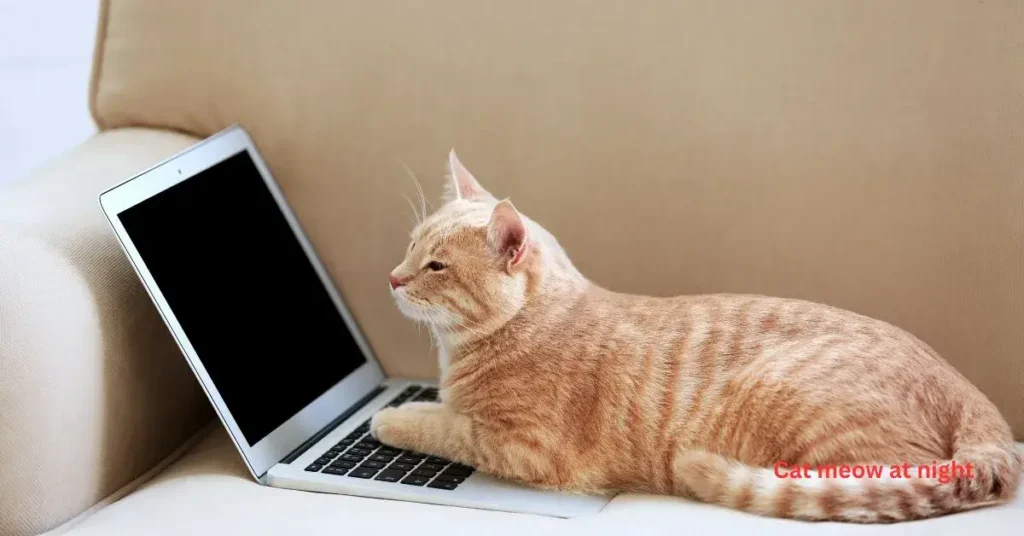
Expert Tips to Help Your Cat Sleep Through the Night
- Create a cozy, dark sleeping space away from distractions
- Use blackout curtains to minimize outside light and stimuli
- Add white noise machines or soft classical music to calm your cat
- Try natural remedies (with vet approval) like valerian or calming chews
- Avoid stimulating toys or food right before bedtime
- Use motion-sensor night lights if your cat seems disoriented in the dark
Extra Tip: Track Your Cat’s Night Behavior
Keeping a journal or using a pet monitoring camera can help identify patterns or triggers in your cat’s nighttime behavior. Are they reacting to specific noises? Do they meow at the same time each night? Tracking can reveal helpful insights.
Bonus Section: Should You Let Your Cat Sleep in Your Bedroom?
This is a personal choice. Some owners love the comfort of a cat curled up at their feet. Others find the meowing or movement disruptive. If your cat is calm and doesn’t disturb your sleep, allowing them in the bedroom can reduce anxiety. However, if they cause sleep disturbances, it’s better to provide them with their own comfy space.
Final Thoughts
Dealing with a cat meow at night can be challenging, but understanding the root cause is the first step to peaceful nights. With consistency, patience, and a bit of detective work, you can reduce or eliminate nighttime vocalizations. Whether it’s through play, feeding adjustments, or medical intervention, you have plenty of tools at your disposal to help your feline friend rest soundly.
Advisory Note
If your cat’s nighttime meowing is disrupting your life or indicates a health problem, don’t hesitate to contact a vet. Early intervention can improve both your cat’s well being and your sleep quality.
